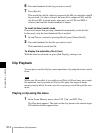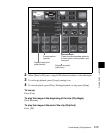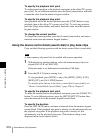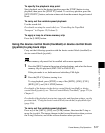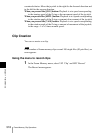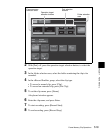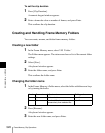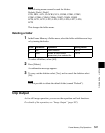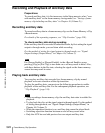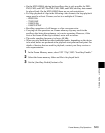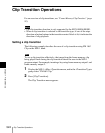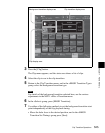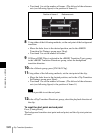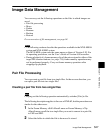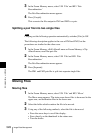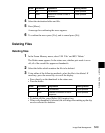
522
Frame Memory Clip Operations
Chapter 7 Frame Memory
Recording and Playback of Ancillary Data
Preparations
To record ancillary data, it is first necessary in the Setup menu to select “save
with ancillary data” as the frame memory saving mode (see “Saving a frame
memory clip including ancillary data” in Chapter 16 (Volume 2).)
Recording ancillary data
To record ancillary data in a frame memory clip, use the Frame Memory >Clip
>Record menu.
For details of the operating sequence, see “Clip Creation” (page 518).
To check ancillary data during recording
If the ancillary data to be recorded is embedded audio, by first setting the signal
output to through mode, you can listen while recording.
For the method of setting the signal output to through mode, see “Signal
Output Settings (Output Menu)” in Chapter 16 (Volume 2).
Note
For [Freeze Enable] or [Record Enable], in the <Record Enable> group,
pressing [Clip] or [Ext Clip] to turn them on or off may result in noise. Also,
with these buttons in the On state, selecting the signal on the frame memory
source bus may result in noise.
Playing back ancillary data
You can play ancillary data recorded in a frame memory clip by normal
playback or an auto transition of the clip transition.
To play the ancillary data, you must use the following procedure to enable
playback of the ancillary data. For the subsequent playback operation, see
“Clip Playback” (page 514).
Notes
• After recording a frame memory clip, the ancillary data state is enabled for
playback.
• To play back the clip, set the signal output to through mode. For the method
of setting through mode, see “Signal Output Settings (Output Menu)” in
Chapter 16 (Volume 2).
• When the reposition function is on, ancillary data cannot be played back.
• Switching reposition function between on and off may cause noise.
• Only the AUX bus and edit preview bus can output ancillary data.



